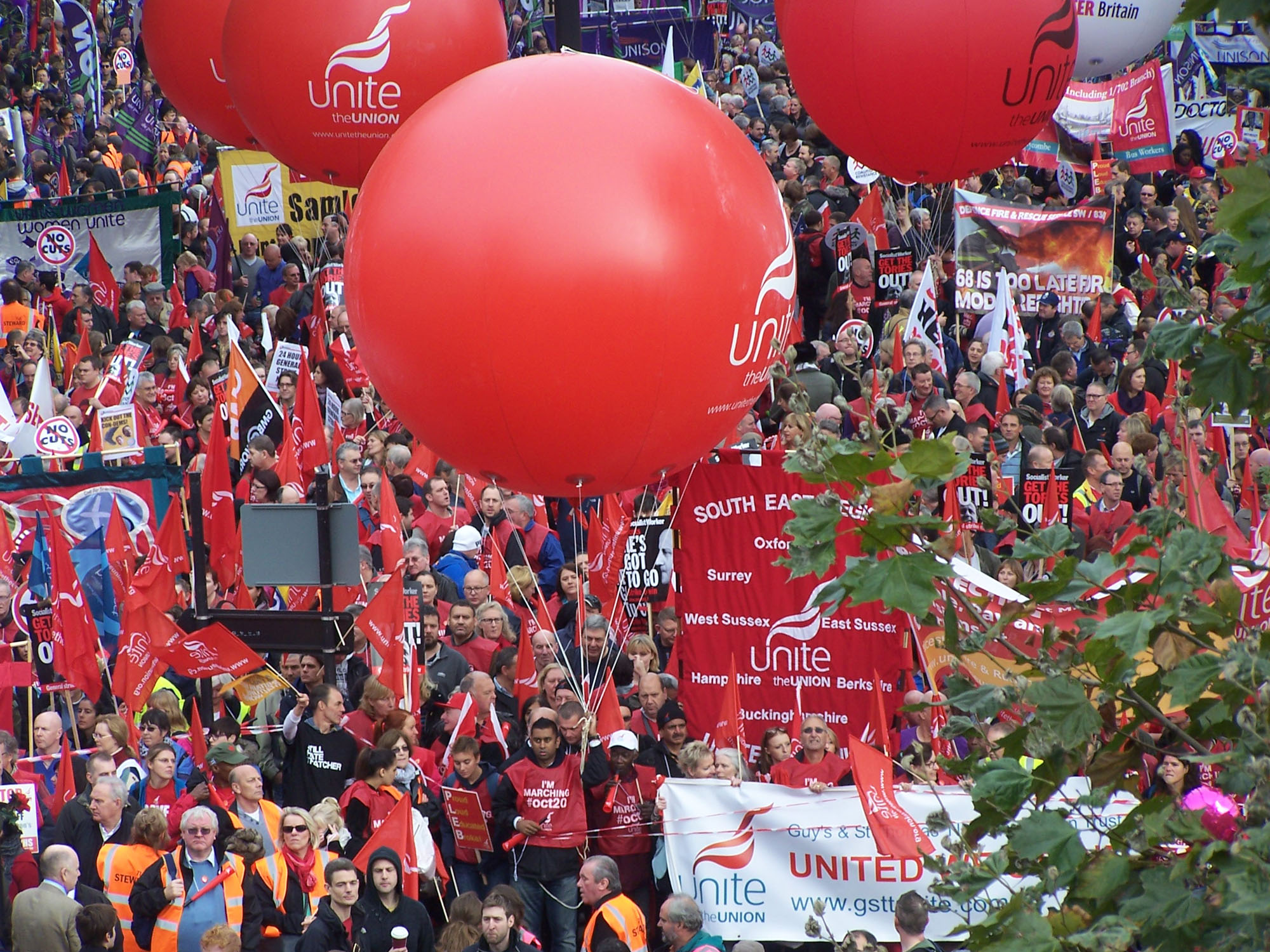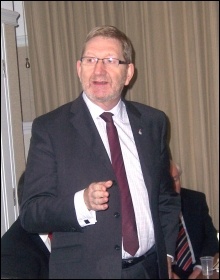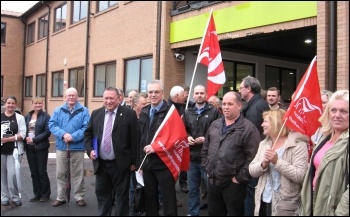Unite meets roadblock in New Labour
Time to discuss bold step of disaffiliation
Rather than opposing Con-Dem austerity, the Labour leadership has committed itself to being a Tory Party Mark II and maintaining the hated cuts.
Attempting to prove itself a safe pair of hands for big business and for capitalism, Labour is also attacking its historic link to the trade unions.
After three Labour governments of war, privatisation and upholding Thatcher’s anti-union legislation, and the experience of Labour-led councils carrying out Con-Dem attacks to the letter, trade union members have been asking why the unions continue to feed the hand that bites it.
Kevin Parslow, a Unite the Union branch secretary and convenor of the group of Unite members in the Socialist Party, looks at Labour’s attack on Unite and argues that the membership must be allowed to debate its response, including disaffiliation.
The attack on Unite, the biggest trade union in the country, following New Labour’s suspension of the election candidate selection process in Falkirk, is a decisive moment in the relationship between the unions and the Labour Party.
Unite’s preferred candidate, Karie Murphy, and constituency chairperson Stephen Deans, have been suspended from party positions.
Tom Watson, New Labour’s general election strategist, has resigned his position following these moves.
New Labour has scrapped the scheme, originally backed by party leader Ed Miliband, which allowed unions to pay the first year of membership subscriptions from their political funds and which Unite used in Falkirk West to sign up over 100 of its members to the party.
Outrageously, Miliband is handing over Labour’s secret report, not shown to Unite, to the police! Unite members will be indignant at these scandalous moves.
They have echoes of Labour alleging ‘corruption’ against the Liverpool city councillors and Militant who fought against cuts in the 1980s. All sorts of scurrilous stories are now circulating in the press and blogosphere about key figures in this situation. If Unite does not fight now, the union will be seriously damaged.
Not independent
Any pretence that Ed Miliband was independent of the right has been blown away by this confrontation as he has become a prisoner of the Blairite faithful. Unite general secretary Len McCluskey was prophetic when interviewed in the journal New Statesman on 24 April this year:
Len McCluskey, Shrewsbury 24 press conference, 23.1.13, photo Bob Severn (Click to enlarge: opens in new window)
“He fears, though, that Miliband could still fall under the sway of those he pejoratively refers to as ‘Blairites’. He singles out the shadow foreign secretary, Douglas Alexander and the shadow defence secretary, Jim Murphy, for criticism.
.
“Ed Miliband must spend most of his waking hours grappling with what lies before him. If he is brave enough to go for something radical, he’ll be the next prime minister.
“If he gets seduced by the Jim Murphys and the Douglas Alexanders, then the truth is that he’ll be defeated and he’ll be cast into the dustbin of history” [our emphasis].
Murphy has been prominent in this crisis with scathing attacks on Unite and Len. One unnamed Blairite has called Unite an ‘organised conspiracy’! Furthermore, these attacks have been egged on by Cameron, the Tories and the capitalist press.
Lynton Crosby, Cameron’s Australian strategist, is said to be behind the Tories’ strategy to egg on Miliband to act against the unions.
They are all in favour of a tame, pro-capitalist Labour Party. Unite must come out fighting to rebut this onslaught at every opportunity.
Transformation of Labour
But this is not just an organisational attack on the trade unions and the left that remain in New Labour.
As the Socialist Party has consistently explained, this is part of the political transformation of Labour from a party based on workers, that had socialist aspirations, albeit with a pro-capitalist leadership, into a pro-big business party with similarities to the Democrats in the US.
Even from the first attacks on our predecessor, Militant, we predicted there would be attacks on the left and left unions.
With reference to the process against the Militant Editorial Board, which led to five expulsions, we wrote:
“The purge will not stop at Militant. It will grow to other left groups within the party” (Militant 628, 26 November 1982, quoted in ‘Rise of Militant’).
Unite is now considered part of the ‘left’ within New Labour and has been compared to Militant by the press! To this end, the Blairites have decided the union must be humiliated. They want to rid the party of union influence and expel unions whose predecessors helped to form the Labour Representation Committee in 1900!
Miliband will propose changes to the relationship between the party and the unions this week, in an attempt to ‘mend not end’ the link. This may end block affiliation of unions to New Labour. But even Kevin Maguire in the Daily Mirror has warned Miliband against ‘carelessly splitting his own party’ when the ‘real enemy’ is Cameron.
Maguire also railed against accepting the Tories’ austerity programme. However, at the weekend right-wing former Labour cabinet minister John Reid was explicit about the Blairites’ aims:
“I am in no doubt that the leader of Unite wants to impose an ideological direction on the Labour Party that would lead us into political oblivion, as it did in the 1970s and 1980s. Ed Miliband didn’t particularly go looking for this fight. This fight came to him. But I think he understands, as everyone else in the Labour Party does, that a struggle of this nature … is a determining struggle about the direction of the Labour Party”.
Reid sent extra troops to Afghanistan when defence secretary in Blair’s cabinet and increased privatisation in the NHS as health secretary! New Labour has consistently refused to listen to the unions on these and other policies. There have been no real commitments on scrapping anti-trade union laws.
Cuts and privatisations are carried out by Labour councils and councillors who oppose them are suspended or expelled.
Now, Miliband and Ed Balls have affirmed their commitment to the Tories’ spending plans. In other words, cuts planned by the Tories will be implemented by a New Labour government, if the party wins the next election.
This will mean confrontation with the working class and the unions. The idea of a general strike against austerity cannot be postponed in the hope of ‘better times’ under Miliband. If not fought for and called now, the demand will still be urgent under New Labour.
Unite’s strategy
The political strategy of Unite, to recruit its members to Labour in order to get more working-class election candidates selected, has come across another roadblock.
The Socialist Party has explained on many occasions that the Labour Party is unreformable. New Labour has closed all the democratic avenues for real change that once existed.
But given Unite’s agreed strategy, we said the only chance it had of being successful would be for Unite to go in with its full programme against all cuts, the scrapping of the anti-trade union laws, and nationalisation, win over the ranks of Labour and get rid of the Blairites.
Even then, we said it would be unlikely to succeed given the obstacles in Unite’s path.
But the union’s strategy was first challenged when a handful of Labour councillors who voted against cuts, some of them Unite members, were suspended or expelled from Labour groups and the party.
The two brave Southampton councillors who opposed austerity have drawn the correct conclusions and become part of TUSC (Trade Unionist and Socialist Coalition).
Warrington councillor Kevin Bennett has recently had his suspension from the Labour group extended for a further six months.
Now the focus has switched onto the parliamentary selection stage. New Labour does not want representatives who would fight for the working class.
Unite now has three possible ways forward. The first would be to capitulate to New Labour. This would be disastrous, not just for its political strategy but for its industrial one too. There would be growing anger and indignation in the rank and file, and doubts would be raised over the union’s commitment to fight for its policy. This would cause serious problems for Len and the left leadership of the union and jeopardise their position.
The second would be to continue with the current strategy. This would mean the likelihood of further collisions with the Labour bureaucracy, in which Len has already admitted he ‘can place no trust’. This would not prevent Unite having to make a decision later on the continued scandal of providing funds to New Labour, to the tune of £9 million since Miliband was elected Labour leader in 2010, with the support of the unions! Immediately, Unite would also face the decision of supporting anti-cuts councillors.
The third path is to take the bold step of the union disaffiliating from New Labour. The Socialist Party believes this is the correct road to take. The working class has waited too long for its own party since New Labour accepted the free market and dropped its famous Clause 4, Part IV, which envisaged nationalisation and socialism.
What Unite should do:
Unite members, in their branches, stewards committees and constitutional committees of the union, should pass resolutions defending the union against these attacks and calling for a full, democratic discussion of the alternative. In particular, they should call on the leadership to implement the following plan of action:
- An emergency executive council should be called to discuss the crisis.
- The EC should pass a resolution for a recall rules conference which would have the end of removing the references to Labour Party affiliation from the rulebook, thereby facilitating disaffiliation. This conference should also discuss political representation for the working class.
- Should this be carried, Unite should call meetings and conferences of trade unionists, from affiliated and non-affiliated unions, including those linked to TUSC, with the aim of forming a new workers’ party which would have the programme of fighting the cuts, scrapping the anti-trade union laws and opposing privatisation of public services. Such a party would truly reflect the needs of the working class and fight in workplaces, communities and in elections for socialist ideas.
NB: This article was updated on 8.7.13
This version of this article was first posted on the Socialist Party website on 5 July 2013 and may vary slightly from the version subsequently printed in The Socialist.












